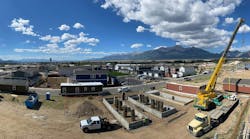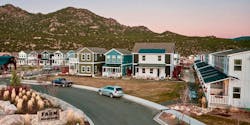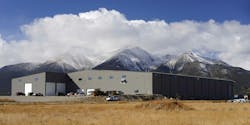The state of Colorado has seen both a population boom and an affordable housing crisis. Its population grew by nearly 15% over the past decade—but its supply of homes for people who make less than $45,000 a year is almost nonexistent, Colorado Public Radio recently reported.
In Buena Vista, a small mountain town about 120 miles southwest of Denver, Fading West Development has been working on a solution: attainable workforce housing.
AN AFFORDABLE MODULAR HOME COMMUNITY
In 2016, Charlie Chupp launched Fading West to build houses for people who then made 80% of the area’s median income. But Chupp quickly realized that traditional onsite construction wouldn’t solve the housing dilemma, given the high costs and the limited availability of general contractors. As the former CEO of Load King, a Florida company that manufactures food stores such as Safeway and Starbucks, Chupp leveraged his manufacturing background—and decided homes could be built more systematically and efficiently through modular construction.
For its debut development, The Farm at Buena Vista, Fading West initially purchased units from two offsite factories in Nebraska. Yet Fading West found there was still plenty of room to standardize and optimize the modular process.
“Many of the folks who do modular or offsite construction really don’t think with a manufacturing mindset, and that was the way we look at all of this,” says Micah Salazar, Chief Operating Officer, Fading West. “Just shoving construction under a roof without a lot of thinking about process, repeatability, standardization, minimizing inventory—there’s not a lot of efficiency gained there.”
Greater efficiency was precisely what Fading West was after. “We looked at the whole value stream—from the time someone orders a home to the time we deliver it—and asked how we can make it better,” Salazar says.
The answer, in part, was to build its own offsite factory, Fading West Building Systems, which opened in Buena Vista in November. There, Fading West constructs modular units not only for its own developments but also for other developers and general contractors. Fading West aims to manufacture an average of 350 to 450 homes annually and ultimately produce 500 to 600 homes a year at full capacity.
HOUSES BUILT LIKE CARS
Like a few other modular builders such as Factory OS and Assembly OSM, Fading West likens what it does to assembling a car, rather than building a conventional stick-frame house. Inspired by the Toyota Production System, Fading West takes a lean manufacturing approach—seeking ways to eliminate waste at every step of the homebuilding process. That includes, for example, reducing the amount of movement required by team members and the amount of wasted materials.
Fading West’s construction costs are 20% lower than a traditionally built home, says Matt Steed, Executive Vice President, Fading West. “But when you factor in speed to completion, that number grows by quite a bit,” Steed says.
Fading West saves time partly through its parallel process: While the factory team assembles the modular home so that it’s 95% complete when it leaves the facility, the onsite team performs much of its work at the same time. That onsite work includes completing the foundations, as well as starting to build any added structures—such as porches, garages, and decks—so that they can be quickly assembled once the modular home is set onto the foundation.
“That cuts down dramatically on the time,” Salazar says of the parallel process. As a result, he adds, “our site has become more of an installation site than a conventional construction site.”
Through such efficiencies, Fading West has reduced the amount of time between setting a home on its foundation and getting a certificate of occupancy—from 110 days to only about 25 days. In total, it takes Fading West about seven weeks from the permits to the occupancy certificates—compared to 6 to 8 months for a traditional build to get from start to finish, Steed says. “We’re looking at saving minutes or even seconds off everything we do.”
Fading West also eschews custom options in favor of a “radically standardized” approach to modular design, Salazar says. “As we look at the market we’re serving—attainable workforce housing—there aren’t many folks who need highly custom homes in that realm.”
So, for example, instead of offering dozens of countertops, Fading West provides just one, high-quality countertop: white quartz. That saves time on managing a lot more, lesser-quality finishes. And it satisfies the customer: “No one in our market complains about nice white quartz countertops,” Salazar says.
The Farm’s first phase, completed this year, comprised almost 100 units with sales prices ranging from $250,000 to $499,000.
Now Fading West is at work on phase two of The Farm, which will include 51 single family homes. To keep the houses affordable for the local workforce, most of the units will be deed restricted, with sales prices ranging from $289,750 to about $469,750. The rest will be sold at market rate.


